(Bloomberg) — Taiwan lawmakers again voted to expand their powers to summon public officials, defying both protesters and President Lai Ching-te, who is now expected to ask the Constitutional Court to review the changes and suspend their implementation.
Most Read from Bloomberg
Around 1,000 protesters gathered outside the legislature, with organizers setting up chairs, tents and air coolers on a bright, hot day in the capital. Lawmakers voted after having — at Lai’s request — reviewed and debated the changes since Wednesday.
The vote sets the stage for more fractious confrontations between Lai and the opposition parties in the island at the heart of China-US tensions. The opposition Kuomintang and its Taiwan People’s Party allies say they want to improve scrutiny of the executive and public officials. Critics view the changes as a power grab that undermines the separation of powers and is aimed at derailing the president’s agenda.
“If TSMC is going to be summoned and probed by the legislature, they would be forced to give out trade secrets, and Taiwan is basically done,” said a 35-year-old chip industry worker surnamed Cheng, referring to Taiwan Semiconductor Manufacturing Co., which makes the bulk of the world’s most advanced chips.
That concern has been a focus of critics, with DPP legislator Puma Shen saying the changes may force companies being probed to disclose sensitive information.
The constitutionality of the legislation is still an unsettled debate, according to Liao Dachi, emeritus professor at Institute of Political Science of National Sun Yat-sen University. Still, she sees the amendments as effectively empowering lawmakers, as the legislative branch in Taiwan has been significantly weaker in capacity compared to the executive branch — the presidency.
While the DPP made history this year by winning its third successive presidential election, it lost control of the legislature, and the vote Friday shows Lai may struggle to enact his agenda in the face of a hostile parliament. Earlier this week, he announced plans for new defense, health care and climate committees to help push through his policies.
The government arranged for 500 police officers to be stationed outside the legislature in case of conflict between supporters from different parties, the semi-official Central News Agency reported.
Still, markets in Taiwan have been largely unfazed by the political confrontation. That benchmark Taiex stocks gauge is set for a gain of more than 3% this week, extending its record high. The Taiwan dollar is little changed for the week.
The measures give the legislature new investigative powers and allows it to hold hearings, with penalties or even jail time possible for public officials who refuse to attend or testify. Taiwan’s Control Yuan, a supervisory branch of government with the power to investigate and impeach officials, has previously said the legal changes risk violating the separation of powers.
Opponents of the amendments this week took to the streets again for a three-day rally to coincide with the lawmaker review of the legislation. Demonstrations have been peaceful, and also so far smaller in scale compared to protests when lawmakers first voted on the changes in May.
Cheng, who attended today’s demonstrations to support the DPP, said opposition parties want to expand legislative powers because they can’t gain any powers outside the parliament.
The KMT has accused the Lai government of conducting political fights since his inauguration on May 20, and legislator Hung Mong-kai says the bill would help hold the president accountable for his policies.
Most Read from Bloomberg Businessweek
©2024 Bloomberg L.P.


